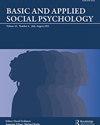中老年成人支持交换对自尊和掌握影响的性别差异
IF 1.8
3区 心理学
Q2 PSYCHOLOGY, SOCIAL
引用次数: 0
摘要
摘要本研究运用社会交换和性别社会化的社会心理学理论,探讨了接受和给予社会支持对美国被调查者自尊和掌握(即自我概念)的影响。我们还探讨了支持交换的不平衡是否对女性(平均年龄= 72)和男性(平均年龄= 73)的自我概念有益或有害。我们使用修补之心志愿者的数据来研究这个话题。在方法上,我们通过检查常见的汇总统计(即均值、标准差、Cohen’s d)以及试图解释偏态的位置和尺度来调查自尊、精通和社会支持的性别模式。我们还比较了双变量相关性与回归分析的结果,以确定结果是否收敛以及何时收敛。首先,均值/标准差和位置/量表揭示了自我概念和社会支持的不同性别模式。其次,在女性中,我们发现给予工具支持对自尊有很大的正向影响;另一方面,零级相关性显示出较弱的影响。在双变量分析和回归分析中,给予情感支持对男性自我概念有较大的正向影响。第三,工具性支持的互惠性总体上有利于自我概念,但对女性的影响更大。第四,情感支持失衡与女性较高的自我概念相关。考虑到1)汇总统计是否考虑到研究测量的偏性和2)相关性与回归系数之间的脱节,我们的研究表明需要批判性地解决方法决策(例如,解决偏性)如何影响社会心理学研究报告的结果以及从中得出的结论。本文章由计算机程序翻译,如有差异,请以英文原文为准。
Gender Differences in the Effects of Support Exchanges on Self-Esteem and Mastery for Mid- to Late-Life Adults
Abstract Applying social psychological theories of social exchange and gender socialization perspectives, we assess gender differences in the effects of receiving and giving social support on self-esteem and mastery (i.e., self-concept) for respondents in the United States. We also explore whether imbalances in support exchanges are beneficial or detrimental to self-concept for women (mean age = 72) and men (mean age = 73). We examine this topic using data from Mended Hearts volunteers. Methodologically, we investigate the gender patterns of self-esteem, mastery, and social support by examining common summary statistics (i.e., means, standard deviations, Cohen’s d) as well as locations and scales which attempt to account for skewness. We also compare results from bivariate correlations with regression analyses to ascertain if and when results converge. First, the means/standard deviations and locations/scales reveal different gendered patterns in self-concept and social support. Second, among women, we find a large positive effect of giving instrumental support on self-esteem in the regression analysis; on the other hand, the zero-order correlation reveals a weaker effect. For men, giving emotional support has a large positive effect on self-concept in both the bivariate and regression analysis. Third, reciprocity in instrumental support is generally beneficial for self-concept, but effects are larger for women. Fourth, imbalances in emotional support are associated with higher self-concept for women. Given the disjuncture between 1) summary statistics that do and do not take into account the skewness of the study measures and 2) correlations versus regression coefficients, our study suggests a need to critically address how methodological decisions (e.g., addressing skewness) affect results reported in social psychological studies and the conclusions drawn from them.
求助全文
通过发布文献求助,成功后即可免费获取论文全文。
去求助
来源期刊

Basic and Applied Social Psychology
PSYCHOLOGY, SOCIAL-
CiteScore
4.50
自引率
12.50%
发文量
7
期刊介绍:
Basic and Applied Social Psychology (BASP) emphasizes the publication of outstanding research articles, but also considers literature reviews, criticism, and methodological or theoretical statements spanning the entire range of social psychological issues. The journal will publish basic work in areas of social psychology that can be applied to societal problems, as well as direct application of social psychology to such problems. The journal provides a venue for a broad range of specialty areas, including research on legal and political issues, environmental influences on behavior, organizations, aging, medical and health-related outcomes, sexuality, education and learning, the effects of mass media, gender issues, and population problems.
 求助内容:
求助内容: 应助结果提醒方式:
应助结果提醒方式:


